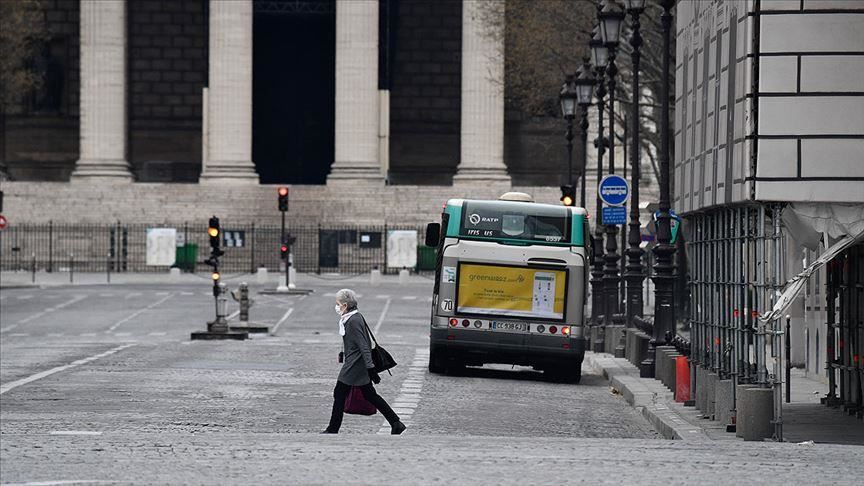French nursing home workers quarantine with residents
Caregivers at facility in west will stay with inhabitants for two weeks to ensure their survival

PARIS
Medical personnel are being praised worldwide for their role on the front lines of the battle against the novel coronavirus, including in France, where posters with the word “Merci!" cover bus stops, Parisians applaud from their windows every night in a mass show of gratitude and even the Eiffel Tower is lit up with a projected message of "Thank you!"
For the next two weeks though, an act of bravery unlike many seen during this crisis is being playing out at a nursing home in the town of Masle, where 18 caregivers at the Bergeron-Grenier home will stay with residents to prevent the possibility of infection, essentially locking themselves in.
"Everyone is participating -- the whole team," Pascal Ramirez, the director, said of the group, who will remain in the building 24 hours a day, seven days a week, for the full two-week quarantine period.
The courageous move was made last week in light of increasing reports of the deaths of elderly patients in nursing homes around France as well as in other countries as the highly contagious coronavirus spreads through a population that is much more fragile than others and deals a heavy blow to facilities unequipped to deal with the illness and its ramifications.
The Bergeron-Grenier home employs 35 full-time staff to care for its residents, which currently number 59. The home's location in Masle lies within the Charente department in western France, the northern part of France's Nouvelle-Aquitaine region.
In the very strategic move, it was decided that the remainder of the staff would stay outside of the home to handle deliveries during the crisis. All food, toiletries, cleaning products and medical supplies are left at the door and sanitized by the staff on the inside immediately as they are brought in.
"They take care of shopping, for example, but do not come in. They leave all of the products outside the door, and we disinfect [them]," said Ramirez.
Another motivation for the move was the illness of Bergeron-Grenier's doctor who serves the residents daily. He is presently ill with the coronavirus and is in self-isolation as a result.
Ramirez is not a doctor or a medical professional but understands all too well the seriousness of the situation. Visits by family members as well as friends were banned a few weeks ago, and all visitors are now prohibited entirely until the quarantine period is over.
A worry for all involved is the possibility of one of the 18 caregivers locked inside the home being a positive carrier of the coronavirus. The disease has been known to show up in those who do not present the typical symptoms of coughing, fever and congestion. A recent report published in a Chinese medical journal revealed that a full 86% of the cases that spread in that country at the virus's peak in December were done so by those who had no symptoms at all.
Putting their residents above all else was also necessary at Bergeron-Grenier in light of a shortage of preventative protective equipment -- masks, suits and gloves. There has been a shortage in many countries, but especially in Europe's hardest hit, France being one.
"We are unfortunately last on the list," Ramirez recounted, "after those who are truly ill and those who are suspected of having the disease. We have only 450 masks, and yesterday, we received only 350. We do not have enough. It's a terrible situation for us."
The home has also not received any testing kits which would help them evaluate the patient as well as the caregiver population better. They are awaiting further news on the receipt of kits in the coming week.
Despite the shortage of supplies, none of the residents have fallen ill or died from the virus since the outbreak began in mid-December.
Mathilde Buxuraud, who has been an occupational therapist at Bergeron-Grenier for only a few months, encapsulated the worry best as she spoke of the people under her care. They are very much the top priority for all of the staff at the moment.
"We were all very afraid of contaminating them. We know very well what can happen if we bring the COVID-19 back into the home," she said.
The decision soon became a cooperative effort by not only the staff but the community. One of the rooms at the home was converted into a dormitory of sorts and quickly outfitted by officials at the town hall who delivered a large number of mattresses for the workers to bunk down on.
Staff brought their belongings to settle in -- clothing, bedding, pillows and books.
"I even brought board games," Buxuraud said, chuckling at the thought of it.
"It is like summer camp, but with 85-year-old children!" Ramirez noted, pointing to the simplicity of life taking the place of the current chaos gripping the globe.
He reported that the staff who have stayed are very happy to help their elderly companions in their time of great need. They take their meals together three times a day, and many of the concerns that used to arise are now nonexistent.
"We take more time to be with the residents. Everyone is equal,” he added.
Anadolu Agency website contains only a portion of the news stories offered to subscribers in the AA News Broadcasting System (HAS), and in summarized form. Please contact us for subscription options.







